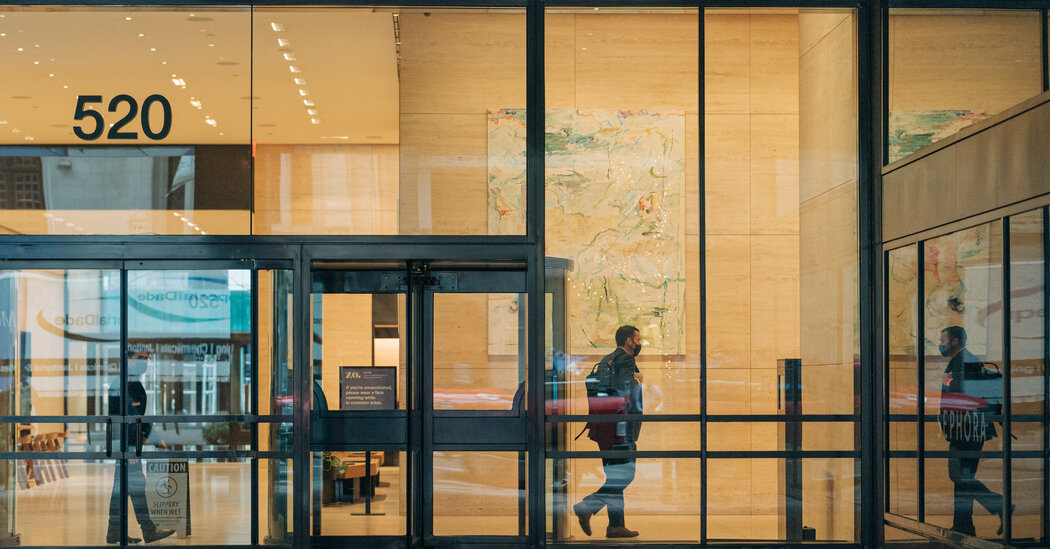Using local guidelines, many companies are loosening Covid safety rules, leaving workers to navigate masking and social distancing on their own.
Employers are embracing a workplace atmosphere reminiscent of prepandemic times — elevators jammed, snack tables brimming, face coverings optional — even as a new subvariant of the Omicron coronavirus spurs concerns about health and safety. Across the country, office occupancy has hit a pandemic high, 40 percent, reached just once before in early December, at the same time that indoor mask mandates drop.
After several false starts in calling workers back, company leaders now seem eager to press forward. A flurry of return-to-office plans have rolled out in recent weeks, with businesses including American Express, Goldman Sachs, JPMorgan Chase and Microsoft calling some workers back to their desks. Many of those companies followed state and local governments in easing Covid-19 restrictions, arguing that ending mask mandates could make workplaces more pleasant. But some workers, especially those with compromised immunity or unvaccinated children, feel uncomfortable with the rush back to open floor plans.
“Masks have created a real psychological barrier to getting back to office culture,” said Kathryn Wylde, head of the Partnership for New York City, a business group. “As long as things are going in a positive direction with Covid, I think the relaxation of mandates will work for the vast majority of people. As soon as we see a reversal, I think we’ve got trouble.”
The Partnership’s January survey of New York City employers found that 38 percent expected to have more than half of their workers back in the office on an average weekday by late March. As employees come back, they’re facing a patchwork of Covid safety protocols. Just one-quarter of U.S. workers are covered by vaccine mandates in the workplace, according to Gallup data from last month.
This has left many workers to navigate masking on their own, making Covid safety measures a matter of office etiquette rather than protocol. Some have negotiated new remote work arrangements with their bosses as rules have eased, or even left their companies in search of jobs at workplaces that made them feel safer.
“When the rules came out that you could drop your mask, many people were like, ‘Yay, we’re free,’” said Diane Rames, 65, an office administrator at a law firm in Oakland, Calif. “I was like, wait a minute — there isn’t a line in the sand that’s, like, it’s here today, gone tomorrow.”
The Return of Return-to-Office Plans
After the Omicron variant crushed companies’ hopes for a return to in-person work late last year, a new R.T.O. chapter now appears to be opening.
- Feeling Hopeful: Antsy executives have a message for their employees: Plans to return to in-person work are real this time (fingers crossed).
- Anxious Workers: Many companies are also loosening Covid safety rules, leaving some employees uncomfortable with the rush back.
- Questioning Office Life: Some workers fear a return to a more rigid workplace culture. Employers are already hearing rumblings of frustration.
- 5 Approaches: From Meta to Dow Jones, here’s how some companies are handling their return to the office.
At the law firm Paul, Weiss, a large event on March 10 was followed by multiple positive Covid test results. The firm notified attendees and conducted contact tracing. Paul, Weiss has required vaccines and boosters for everyone entering its offices and has not yet required a return to the office, though employees are encouraged to come in several days each week. Following local health guidelines, the firm no longer requires its workers to be masked in common areas in the office.
“The health and safety of all of our employees remains our highest priority,” said Brad Karp, the firm’s chairman. “We will continue to do everything possible within our control to ensure the continued health and safety of the Paul, Weiss community.”
Wall Street has been quick to shift its Covid-19 protocols after New York State dropped its indoor mask mandate last month. At JPMorgan Chase, masks are now voluntary for vaccinated and unvaccinated employees, and the firm will discontinue mandatory Covid testing as well as the reporting of Covid infections by April 4. At Morgan Stanley, where vaccines are required to enter the office, the mask requirement was dropped early last month.
Goldman Sachs dropped mask requirements on Feb. 14, though it still requires testing. Citigroup dropped its mask requirement last week. Wells Fargo has maintained more rigid Covid protocols than some of its finance peers, requiring unvaccinated employees to wear a mask at all times unless they are eating, drinking or alone in an enclosed room.
Other industries that have made a push for in-person work, such as real estate, have also reformulated their Covid guidelines in recent weeks. BlackRock, which has asked its 7,600 U.S. employees to return to the office at least three days a week, no longer requires masks in its U.S. offices, though employees have to be vaccinated to enter the building and are asked to test twice a week. Prologis, a logistics real estate firm, said its office mask guidelines were consistent with local regulations. Guardian Life Insurance, which has about 6,300 U.S. employees, does not have an in-office mask requirement in most areas of the country.
Still, some tech companies are holding firm on Covid safety protocols. Google requires any unvaccinated employees with approval to enter its offices to test regularly and wear a mask. Meta, the parent company of Facebook, requires anyone entering the office to be vaccinated — including with a booster starting March 28 — and follows local guidelines on masking.
Intuit announced on Wednesday that starting on May 16, its 11,500 U.S. employees would return to the office in a hybrid model, in which teams determine how many days per week workers should be in person. While the company requires anyone entering its offices to be vaccinated, it follows local and state guidelines on masking, meaning masks are not required in any of its U.S. offices.
“We’ve tried to stress that people should feel comfortable doing whatever feels best for them,” said Chris Glennon, Intuit’s vice president of global real estate and workplace. “We are seeing some folks masking, particularly in public areas, but by and large most are not masking.”
Nationwide Insurance, which has 25,000 U.S. employees, has instituted a hybrid model in which workers come to the office anywhere from one to five days every other week, though it says the office is never above 50 percent capacity. The company does not require vaccines and lifted its mask guidelines on March 2. Any employees who test positive for the virus after coming to the office are required to report their result so the company can do contact tracing.
At Jefferies, an investment bank in New York, masks are still required in office common areas. The company has embraced hybrid work, and on peak days, its office is almost back to its prepandemic occupancy rate of 70 percent. TIAA, an investment firm with a roughly 97 percent vaccination rate, no longer requires vaccinated workers to wear masks in common areas, except for where required by local regulations — but noted that it provided at-home molecular tests for employees.
For those tasked with developing office protocols on masking and vaccination, the easing of state and local government guidelines has brought a new set of challenges. Some said they struggled to appease colleagues who wanted looser policies while also maintaining an environment that feels safe. Those concerns mounted this week, as the BA.2 subvariant drives an uptick of Covid cases in Europe, possibly portending a similar rise in the United States.
Ms. Rames, the office administrator in Oakland, recalled that the same week California dropped its indoor mask mandate, one of the partners at her law firm came in and removed all the office signs encouraging social distancing. Ms. Rames has often felt like the “Covid police” when she gently reminds colleagues to pull their masks over their noses and urges people to space themselves out.
She finds herself torn between the partners eager for a return to prepandemic office culture and employees like herself who are nervous about exposure to Covid-19.
“I understand Covid fatigue, but people don’t understand how crushing of a burden it is to try and keep everybody safe,” Ms. Rames said.
Workers with children too young to be vaccinated have been especially hesitant to report back to their desks. Some companies have allowed caretakers to negotiate special accommodations for remote or hybrid work, an option that many working parents said they had embraced.
“I have made it clear to my boss and several layers of bosses above me that I have no intention of returning to the office until my young kids are vaccinated,” said Greg Howard, 36, who works at a tech company and lives in Kirkland, Wash., with his children, a 4-year-old toddler and an infant.
Some workers have even switched jobs in pursuit of safer working environments. Saskia Cervantes, 42, worked at a natural food company in Denver that started encouraging its employees to return to the office last April, as Covid vaccines became widely available. Masks were required by local regulations, but she found that most of her co-workers didn’t wear them. Ms. Cervantes, who is immunocompromised, felt out of place as one of few masked workers in the office.
She moved companies in August, taking a pay cut, because she wanted to be at a business that allowed permanent remote work.
“It was the kind of thing where you’d go into someone’s office and they’d say, ‘Are you comfortable with masks on or off?’” she recalled. “It was like, ‘Look at me, I’m wearing an N95.’”
For many employers, there’s a sense that they know what is required to keep businesses open and workers safe, having weathered the Omicron and Delta surges. And having revised their return-to-office date several times, they’d like to stick to their plans. But they also recognize that as restrictions loosen, they’ll need to keep a sharp eye on fluctuations in Covid case rates, especially with some people ready to walk if safety standards aren’t maintained and remote work isn’t an option.
“We’ve gone from guarded optimism to a more confident certainty,” said Mr. Glennon, of Intuit, though he added that the company was staying vigilant in monitoring the state of the virus. “It’s going to take quite some time until everybody feels that we’re beyond this.”



























